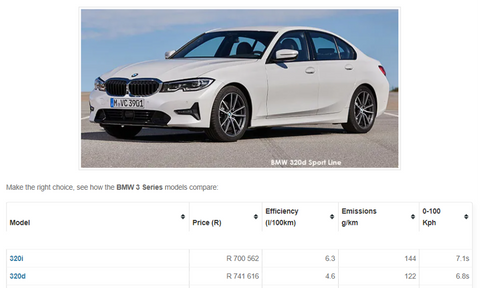You have no items in your shopping cart.

You’ve made the big decision to buy a new car, but should you opt for a petrol or diesel engine? This choice can play a vital role in your final decision, so if you’re struggling to make up your mind, it can be useful to look at the pros and cons of both petrol and diesel engine cars.
It is not a clear-cut choice, as both engine types have advantages and disadvantages, although the respective ‘weaknesses’ of each type is getting smaller by continuous advances in technology.
The latest diesel driven cars are not the noisy, smoky vehicles they used to be ten years ago. Advances in engineering technology have made it such that they compare favourably against petrol-driven cars both in performance and refinement. All the while the gap between petrol and diesel is closing. Manufacturers are working to improve torque for petrol engines on the one hand and responsiveness for diesel engines on the other.
Costs Comparison
Purchase Price
It is widely accepted that diesel cars are more expensive to buy, with manufacturers asking more for diesel models than their equivalent petrol-powered sibling. This is true too in the South African market. For example, the BMW 320d costs R40 000 more than its petrol counterpart, the 320i. The diesel engine produces 140Kw and 400Nm and is good for a 6.8 second 0-100 Km/h. The petrol version churns out 135Kw and 300Nm and hits the 100km/h mark in 7.1 seconds.

The increased price is usually attributed to the increased complexity of diesel engines, which makes them more expensive to produce. Certain parts, such as the diesel Injectors and the intricate fuel pump, are particularly pricey. If you are comparing a turbodiesel engine to a normally aspirated petrol engine, then you may find additional pricey parts such as the turbocharger and intercooler, if equipped with one. (In the case of the aforementioned BMW, the petrol variant is also turbocharged).
Maintenance & Servicing Costs
Maintenance costs depend on the make and model of the vehicle, but in general, diesel engines generally cost more to maintain over petrol engines. Service intervals are usually more frequent than those of petrol-powered vehicles. Again, this is a generalisation as some manufacturers have aligned the service intervals of both models.
What is true though, is that the same diesel-specific components which make diesel engines more expensive to produce, are what make them more expensive to maintain! Components like the diesel pump, the injectors or the turbo are all very expensive to replace should they fail or reach the end of their design life.
Fuel Costs
Diesel engines are more economical if you drive long distances. However, it’s not a rule of thumb that diesel engines are more economical. In fact, in a predominantly urban environment, such as taking the kids to school or popping to the shops, a petrol engine will almost certainly be a more cost-effective option. However, if you predominantly drive long distance, spend hours on the highways, and carry or tow heavy loads, a diesel engine gives you more kilometres for your money. In such conditions, a typical diesel engine gets around 30 percent better fuel economy than its gas counterpart.
The reason diesel engines are favoured for commercial vehicles, long distance driving and those carrying heavy loads, is due to one word: Torque. Diesel engines generate plenty of twisting force (which is what the word “Torque” means). As a rule, diesels produce more torque than an equivalent petrol engine.
If we refer back to the example of BMW 320i and 320d I quoted earlier, we see that the Kw difference is negligible. (135 KW compared to 140 KW). However, the difference in torque is significant (300Nm in the petrol compared to 400Nm in the diesel).
In addition to producing a good amount of torque, it is usually available at low revs. A modern turbodiesel typically puts out maximum torque at around 2000rpm, relatively low in the rev range. This means the engine will pull strongly without needing to be revved hard. A petrol engine will generally have less torque but more peak power, delivered at higher revs than is typical for a diesel. So, to accelerate strongly a petrol engine will need to be revved higher and harder than a diesel, and the driver may need to change gear more often. Fuel consumption is directly proportional to RPM, so being able to keep the revs low on a diesel benefits its fuel consumption. It also makes a diesel much more relaxing to tow with than a petrol.
Insurance Costs
It’s also worth considering that insurance prices vary for diesel and petrol cars, so it can be useful to get a few insurance quotes to ensure you’re seeing the full picture. Because the purchase price of a diesel is generally more than petrol, the insurance costs are usually slightly higher. Maintenance plans may also be more expensive as diesel engines are more complex.
Overseas publications show that diesel cars can be around 10-15% more expensive than petrol equivalents. Diesel tends to have higher average repair costs which reflect on the insurance. Not only that, but insurers must also factor in overall replacement costs into your premiums. So, with diesel cars being more expensive to buy this will also add some extra onto your premium, in the case of theft.
Diesel cars have higher average accident repair costs overall, and because insurers must factor in the higher overall replacement cost if a diesel if stolen.
Longevity
Diesel engines do last longer than petrol ones. Diesel is a light oil and when burned and used as fuel by the vehicle it lubricates the parts of the engine. This prolongs the life of the engine. Petrol is a detergent and washes away oil from the components of the engine, therefore, wearing it out quicker.
Typically, you can get between 250,000 km to 300,000 km from a petrol engine before it starts to burn oil and wear out. A diesel engine can easily manage 500,000 km and still have room to keep going and going. If your diesel engine is properly maintained, most mechanics say that you can expect it to run on the road for 30 years. (ref The Globe and Mail)
Tax
In South Africa, the carbon tax for new cars affects the price of petrol cars more than diesel ones because of the higher carbon emissions.
Other Factors
Driving Experience
In general, petrol engines are less noisy and more refined than diesel engines, but diesel engines offer more low-speed torque, which gives them more power for overtaking and towing.
There used to be a negative perception that diesel cars were slower, smellier, noisier and more expensive than petrol cars. Modern diesels have closed the gap significantly in these categories.
Likewise, modern petrol engines have improved low down torque and better fuel economy, thanks to turbocharging and other innovations.
Summary
While the gap between modern petrol and diesels are narrowing, there are still some large differences in the characteristics of cars using the different fuels that make them suitable for different uses.


